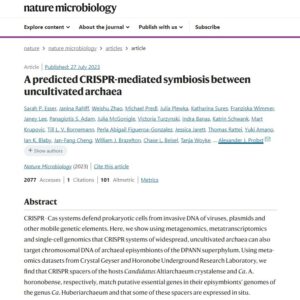On July 27, 2023, the team of project partner Prof. Dr. Alexander Probst published a possible new function of the CRISPR/Cas system in the renowned journal Nature Microbiology. Archaea also use the gene scissors to fight parasites. Thus, the CRISPR systems were also found in widespread previously uncultured archaea. These live as hosts and parasites in the deep biosphere.
The result of metagenome analyses of the deep biosphere microbial community showed that there were strikingly few parasites in company with the hosts, and the hosts exhibited genetic resistance to the parasites. The reason for this is provided by the genetic scissors in the genome of the microorganisms. In the course of evolution, the archaea have incorporated the parasitic DNA. If a parasite with the same DNA now attacks the organism, the foreign genetic material is probably recognized by the CRISPR system and presumably degraded.
Publication: A predicted CRISPR-mediated symbiosis between uncultivated archaea | Nature Microbiology
Press release: Meldungen aus der UDE (uni-due.de)

